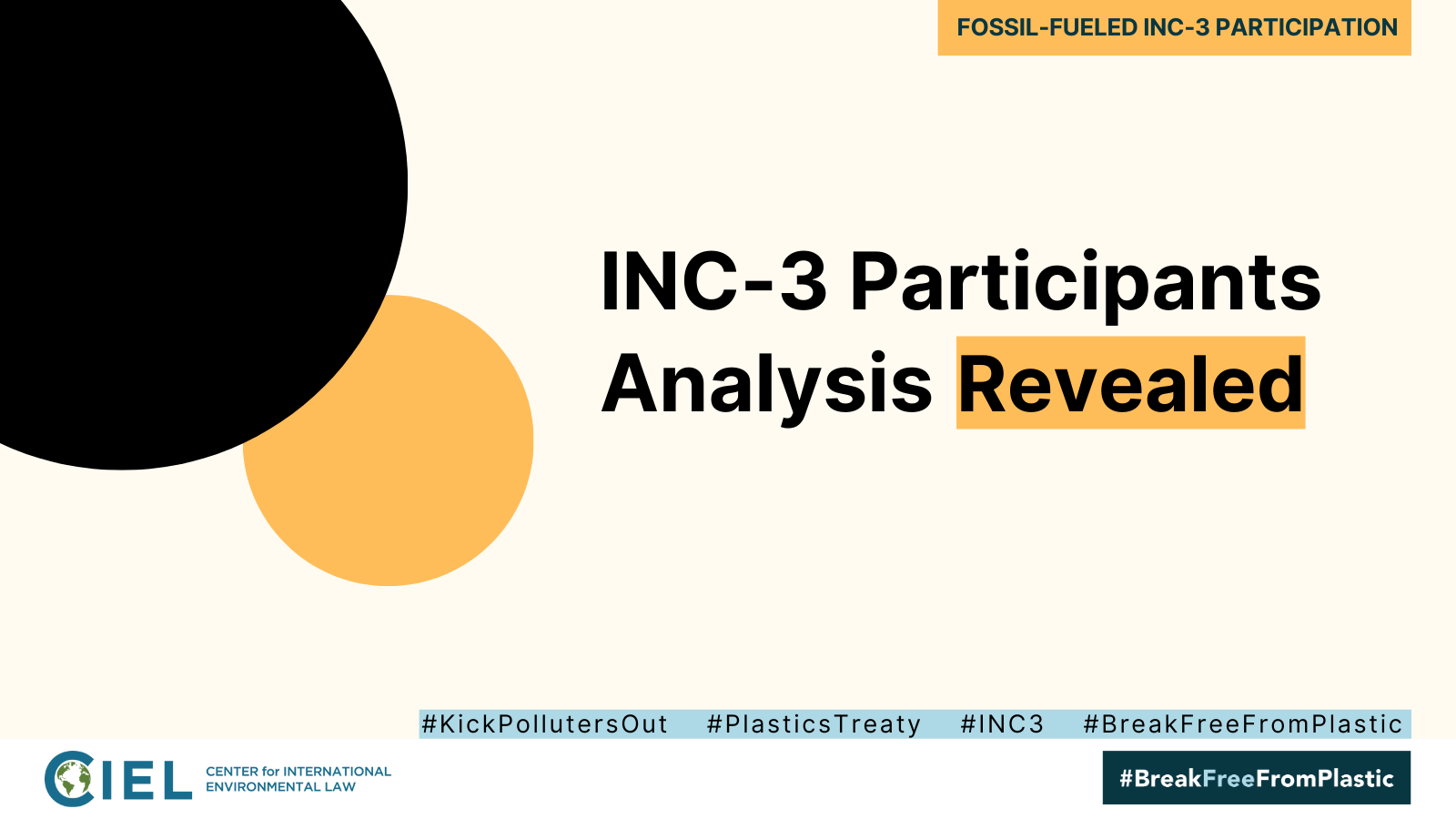November 15, 2023
NAIROBI — 143 fossil fuel and chemical industry lobbyists have registered to attend the third session of the Intergovernmental Negotiating Committee (INC-3) to advance a global plastics treaty, gaining access to the negotiations at a time when the talks are entering a critical phase.
A new analysis from the Center for International Environmental Law (CIEL), supported by Greenpeace, Beyond Petrochemicals, International Pollutants Elimination Network (IPEN), and Break Free From Plastic, is based on the United Nations Environment Programme’s (UNEP) provisional list of INC-3 participants, shows the magnitude of corporate lobbying influence at the negotiations. It comes after civil society organizations and scientists have petitioned UNEP and the INC Secretariat to safeguard the negotiating process from industry influence and to implement strong Conflict of Interest policies.
“Time and time again, we have seen how industry influence has blocked substantive progress in environmental treaty negotiations, including in spaces like the climate COP,” says Delphine Levi Alvares, Global Petrochemicals Lead at CIEL “At INC-2, the Secretariat stated that there were ‘not a lot of fossil fuel companies in the venue.’ Our analysis shows that is simply not true — their presence is only increasing. We must course-correct immediately to ensure that the plastics treaty is grounded in science and does not become a fossil-fueled treaty.”
The analysis finds that:
- 143 fossil fuel and chemical industry lobbyists registered for INC-3, a 36% increase from INC-2.
- The 143 fossil fuel and chemical company lobbyists at INC-3 outnumber the 70 smallest Member States delegations at the negotiations.
- Six Member States have fossil fuel and chemical company lobbyists in their delegation.
- Chemical and fossil fuel lobbyists outnumber the 64 representatives from the Pacific Small Island Developing States by more than two to one.
- The count of 143 fossil fuel and chemical company lobbyists at INC-3 is greater than 38 Scientists’ Coalition for an Effective Plastics Treaty participants.
CIEL’s estimate is likely to be conservative, as our methodology relies on delegates to the talks disclosing their own connections to fossil fuel or chemical industry interests, and many lobbyists may choose to obscure that link.
The mandate to negotiate the plastics treaty calls for a comprehensive approach that ‘addresses the full life cycle of plastics.’ To achieve this goal, it is essential to develop a treaty that recognizes that the start of the plastic life cycle begins with the extraction of fossil fuels. The vast majority of chemicals used to produce plastics are derived from fossil fuels, and the companies that dominate these industries have a strong incentive to ensure that the treaty does not impact their underlying business models.
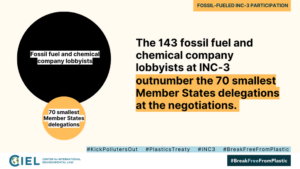
INC-3 marks the scheduled midpoint in the negotiations, and it’s the first time that negotiators will turn to treaty text. The Zero Draft contains options that include if and how to address plastic production and approaches to chemical management.
The fossil fuel industry has long viewed plastics as a lifeline. Between 2000 and 2019, global plastic polymer production doubled, reaching 460 million tonnes (Mt) per year, and it is anticipated to almost triple from 2019 levels by 2050. Meaningful measures to address the plastics crisis necessitate a full life cycle approach that includes substantially reducing plastic production.
“The fossil fuel and petrochemical industries are heavily resisting people- and planet-saving measures in the global plastics treaty. Their growing presence in the negotiations is very telling. A strong and ambitious agreement that will cut plastic production by at least 75% by 2040 means they will need to find another way to satisfy shareholders. We urge UN member states to listen to the millions of people around the world who want an end to plastic pollution, rather than the fossil fuel lobby,” says Graham Forbes, Greenpeace Head of Delegation to the negotiations and Global Campaign Lead for Greenpeace USA.
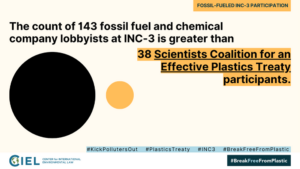
Other plastics interests represented at INC-3 but not included in the analysis include product manufacturers, fast-moving consumer goods companies, producers of plastic alternatives, or purveyors of false solutions to the plastics crisis, such as chemical recyclers, plastic credit companies, or ineffective clean-up technologies providers.
For the full scope of plastics’ impacts on health, human rights, and the environment across the entire life cycle to be taken into account, the participation of civil society organizations, Indigenous Peoples, women and youth, independent scientists, and workers must be prioritized in the negotiation process.
“The unchecked political power of the petrochemical industry is already wreaking havoc on communities worldwide and it can’t be allowed to infect treaty negotiations,” said Heather McTeer Toney, Executive Director of Beyond Petrochemicals. “The credibility of these proceedings depends on shared trust, a quality lacking in the petrochemical industry. Those participating in the Intergovernmental Negotiating Committee process have an obligation to be good actors working in the best interest of our planet. The business model of the petrochemical industry is built on sacrificing the health and well-being of both our planet and its people. This dangerous level of influence must be addressed while we continue to elevate the voices of frontline communities who the petrochemical industry hopes to quiet.”
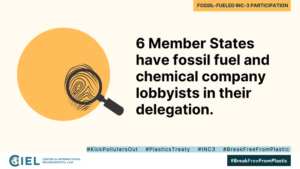
Protecting public participation will not be enough — steps must also be taken to counterbalance the industry’s outsized influence over policy negotiations. Civil society organizations and independent scientists are leading the call for UNEP to adopt a strong conflict of interest policy and an accountability framework.
“That 143 of fossil fuel and chemical companies lobbyists have been admitted into the negotiations, and that they far outnumber our independent scientists, is highly problematic,” added Bethanie Carney Almroth, Professor in ecotoxicology and zoophysiology at Gothenburg University. Member of the Steering Committee of the Scientists’ Coalition for an Effective Plastics Treaty. “Indigenous knowledge holders and scientists have already called for steps to put people before polluters. Negotiations must be based on robust, independent science and knowledge. Now it is time for UNEP to take action. They must adopt a strong conflict of interest policy, including an accountability framework, protect spaces around the negotiations from industry influence, and guarantee seats for indigenous knowledge holders and independent scientists. Only then can we guarantee a process that lays the groundwork for the best policy outcome possible.”
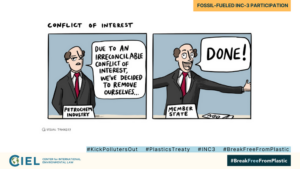
NOTES FOR EDITORS
More quotes from civil society organizations and rightsholders are included below.
Von Hernandez, Global Coordinator for the #BreakFreeFromPlastic movement, said:
“This is not the first time that fossil fuel interests have tried to influence a process intended to check and curtail the pollution they have spawned and created. We have seen this many times in the climate treaty process, and lamentably, it is being repeated here. That they have descended in great numbers in Nairobi shows what and how much is at stake here. People and planet must come first — they cannot be left hostage to these predatory interests.”
Pamela Miller, Co-Chair of the International Pollutants Elimination Network (IPEN), said:
“Fossil fuel, chemicals, and plastics corporations are here en masse to ensure that they can exponentially increase toxic plastics production at the expense of our health and that of future generations. We must have a strong, health-protective treaty that is based on independent science and free of these conflicts of interests.”
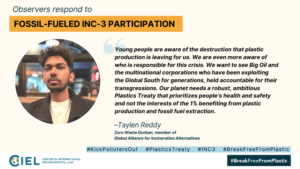
Swathi Seshadri, Oil and Gas Team Lead at the Centre for Financial Accountability, said:
“It is an antithesis to have polluters in the room while negotiating a phase-out of the extremely polluting polymer and plastics industry. Apparently, all observers are not equal. That there are far more requests for the floor from Civil Society Organisations and Rightsholders as compared to representatives of the business community, is testimony that they have direct ways of communication. While we are waiting for our turn to speak or the benevolence of regional groups to open their doors to us, polluters are openly influencing the outcome of a Treaty on plastics, which has life-altering impacts on frontline communities and those who have been historically dispossessed.”
Frankie Orona, Executive Director of the Society of Native Nations, said:
“The fossil fuel and petrochemical industries that have been sacrificing our communities for generations in the name of profit and so-called progress have no business in these negotiations. These corporations and the nations that enable them are solely responsible for the triple planetary crisis of biodiversity loss, pollution, and climate change. Their continued violence against Indigenous, and Black and Brown communities around the world, as well as the health, well-being, and human rights of all, cannot be overstated. It is a crime in and of itself that they continue to exert unjust influence in these negotiations.”
Jacob Kean-Hammerson, Ocean Campaigner at the Environmental Investigation Agency (EIA), said:
“If you didn’t know it before, we are now waking up to the fact that plastics are fossil fuels and we are seeing the same industry playbook being deployed here that has undermined the climate negotiations. The increasing presence of industry threatens to derail an ambitious plastics treaty. We must stand firm in calling out the vested interests and corporate greenwashing narrative.”
Methodology Note:
For this analysis, we used the provisional list of participants at INC-3, released by UNEP this week, scraped and analyzed line by line.
We considered a fossil fuel or chemical industry lobbyist to be anyone representing the interests of a fossil fuel company, chemical company, and its shareholders. This included organizations and trade associations representing the fossil fuel or chemical industries or organizations including associations, non-profits, or think tanks that received significant support from those industries, or included industry figures in their governance or have a track record of lobbying for pro-industry positions. All delegates at INC-3 are assumed to be attempting to influence the negotiations in some way.
Delegates at INC-3 register to attend the negotiations with a delegation including national delegations, intergovernmental organizations, and Civil Society Organizations. Businesses are not allowed to register directly to attend and so often appear with the delegation of trade associations or in country’s delegations. Delegates may provide further information when they register which may include their role at another company or organization or their job title. Companies and organizations were researched using open sources including their websites, lobbying databases, and reputable reporting.
To establish a delegate’s link to the fossil fuel or chemical industry we relied solely on the information provided in the UNEP provisional list of attendees, including both their delegation and any further affiliation the delegate disclosed. This means that our estimate is likely to be conservative as some delegates may choose not to disclose their ties to industry.
news@breakfreefromplastic.org

